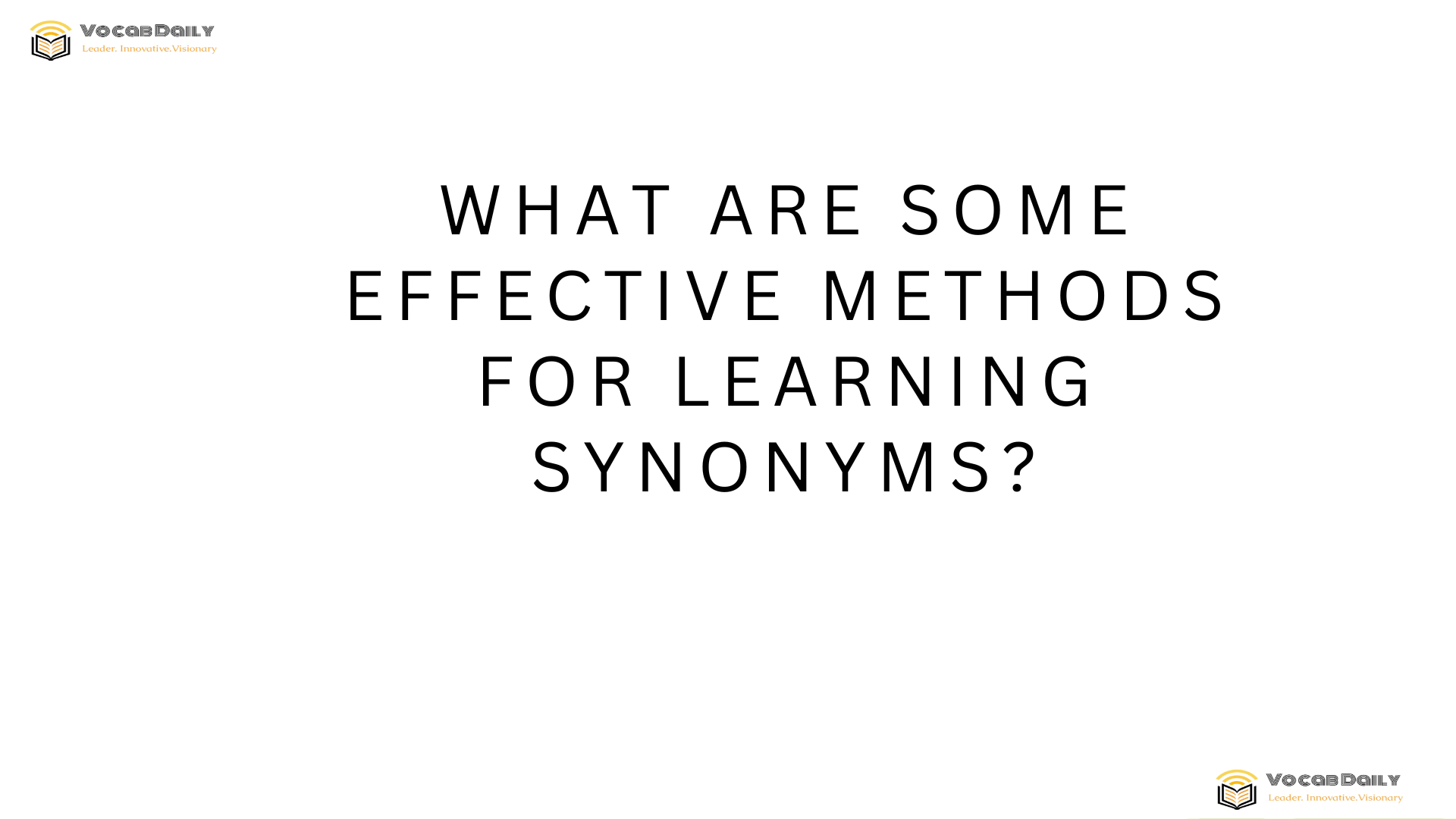What are some effective methods for learning synonyms
Understanding the Importance of Synonyms
Learning synonyms is a vital part of improving vocabulary and enhancing language skills. Synonyms are words that have the same or nearly the same meaning as another word. By expanding your knowledge of synonyms, you can express ideas more clearly, avoid repetition, and make your writing and speech more engaging. Moreover, mastering synonyms helps with reading comprehension and can aid in standardized tests where vocabulary plays a crucial role.
Using Thesauruses Effectively
A thesaurus is one of the most powerful tools for learning synonyms. It provides lists of words with similar meanings organized neatly. When you encounter a new word, look it up in a thesaurus and review its synonyms. Pay attention to subtle differences in meaning or usage. Not all synonyms are interchangeable, so understanding context is essential. Try creating sentences using different synonyms from the thesaurus to gain a practical grasp of each word’s nuance.
Flashcards: Engaging with Synonyms Actively
Flashcards are an excellent method to memorize and recall synonyms. You can create your own flashcards with a word on one side and its synonyms on the other. This active recall technique boosts retention. Additionally, you can use digital flashcard apps that often have built-in spaced repetition systems, which help you review synonyms at optimal intervals for long-term memory. Using flashcards regularly will gradually build a rich synonym vocabulary bank.
Contextual Learning Through Reading
Reading diverse materials like books, articles, and essays exposes you to synonyms used in natural contexts. Pay attention to how different authors choose particular words to convey subtle differences in meaning. When you encounter a new word, note down its synonyms and how they are used. Highlight phrases or sentences that include synonyms to understand their usage better. This contextual approach makes learning synonyms more meaningful and easier to remember.
Writing Exercises to Reinforce Synonyms
Writing is a practical way to integrate synonyms into your vocabulary. Try rewriting sentences or paragraphs from your reading materials by replacing key words with their synonyms. This exercise improves your understanding of when and how to use synonyms appropriately. Additionally, maintaining a personal journal where you consciously use new synonyms encourages active usage. The more you practice, the more natural synonym usage becomes in your speaking and writing.
Engaging in Word Games and Quizzes
Word games and quizzes make synonym learning fun and interactive. Games like crossword puzzles, word searches, and synonym matching boost your ability to recall synonyms under pressure. Several online platforms and apps offer synonym-focused challenges tailored to different skill levels. Regularly participating in these activities can keep your learning fresh and motivate continued vocabulary growth.
Using Synonym Lists and Themed Word Groups
Organizing synonyms into lists or themed groups can facilitate easier memorization. For example, you might group synonyms related to emotions (happy, joyful, elated) or synonyms for “big” (large, huge, enormous). This approach helps your brain associate words with similar meanings and themes together rather than in isolation. When studying, review these lists periodically to strengthen your connections and recall.
Leveraging Technology for Learning Synonyms
Several language learning apps and websites specialize in vocabulary building and include synonym exercises. Tools like vocabulary builders, synonym finders, and interactive quizzes enhance engagement. Many platforms adapt to your progress by providing customized practice sessions focused on synonyms you find challenging. Incorporating technology into your learning routine can add variety and track progress effectively.
Incorporating Synonyms into Daily Conversations
Practicing new synonyms in daily conversations helps solidify your vocabulary. When speaking, try consciously substituting ordinary words with their synonyms to enhance your fluency. Even small efforts like describing objects, feelings, or situations with multiple synonyms will boost your confidence. Engaging in discussions with others, especially language enthusiasts, provides constructive feedback and new synonym exposure.
Mind Mapping to Connect Synonyms
Mind mapping is a creative method where you visually organize synonyms around a central word. Starting with a base word, branch out with related synonyms, and connect any that link directly to each other. This visual representation helps you see relationships between words and understand subtle variations in meaning. Mind maps can be customized and expanded as your knowledge grows, making them a powerful memory aid.
Reading Synonym-Rich Literature and Poetry
Literature and poetry often use rich, varied vocabulary, showcasing many synonyms in context. Reading classic novels, contemporary fiction, or poems exposes you to elegant and creative uses of synonyms. Annotate the text by highlighting synonyms and investigating how their use affects tone and style. This deep dive into language artistry enhances your appreciation for synonyms and helps you internalize them.
Collaborating with Study Partners
Learning synonyms with peers can be highly effective. Study partners can quiz each other, share synonym lists, and discuss word meanings and differences. Group study sessions encourage active use of synonyms through dialogue and collaborative writing exercises. Social interaction makes learning dynamic and less monotonous, helping you stay motivated on your vocabulary-building journey.
Tracking Progress and Setting Goals
Setting specific goals for learning synonyms keeps you focused and motivated. For example, aim to learn five new synonyms daily or master synonyms related to a particular topic weekly. Keep a journal or digital tracker recording words learned, usage examples, and areas needing improvement. Monitoring progress provides a sense of achievement and identifies what learning methods work best for you.
Also check out VocabDaily workbook collections.

Leave a Reply